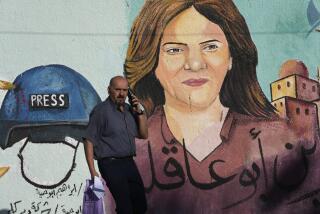Between Media and Military, It’s a Tug of War : TV AND THE GULF WAR
- Share via
News from the battlefront: Day after day, it’s offense and defense, maneuvers and feints, sneak attacks, retreats, counterattacks and strategic withdrawals along with confusion. Not very pretty.
Persian Gulf hostilities?
No, press briefing hostilities.
Watching these daily televised military and Pentagon briefings is a fascinating if sometimes dazing experience, bringing to mind what CNN correspondent Peter Arnett has said about reporting from Baghdad during this war: “I can only say what I see, and I can’t always say I’m seeing what I think I’m seeing.”
What viewers are seeing--live only on CNN usually--are separate military briefings by the Americans, Saudis and British in Riyadh, Saudi Arabia, followed by Pentagon briefings in Washington, all of them now skirmishes. As the press has grown frustrated with what some consider to be stonewalling by those in command of the military, the civility that once characterized these gatherings has increasingly given way to combativeness. No more Robert’s Rules of Order.
CNN, the two-way telescope connecting the United States and Iraq, sends not only Saddam Hussein into your home but also the media and U.S. spokesmen clashing over interpretations of the war against Hussein.
“Then you’re saying . . . “
“That’s not what I’m saying!”
Even though it seemed to be what he was saying.
There are plenty of bones to pick with CNN’s continuous spewing of raw, evolving stories, featuring endless erroneous information, without knowing even if they are stories. That’s technology on a fast track.
On the other hand, although these press briefings are unrefined segments of an incomplete story, televising them yields valuable insights into the role of the press, an area of the democratic process frequently misunderstood.
Viewers can actually chart the progress of a story--such as the mysterious appearance of those Iraqi planes in Iran--through the various briefings.
This is pretty amazing stuff, as right before us the traditional adversarial give-and-take between press and government is played out during wartime, one side pressing to know more, the other determined to tell less.
It’s obvious from watching these mini-struggles that both sides occasionally go too far.
Incredibly, at this late date, some reporters continue to push the military and Pentagon for the kind of precise battle plans that they have repeatedly been told cannot be disclosed for security reasons. Still other reporters misdirect their questions, asking military men about diplomacy, for example. When will they learn?
However, given the dissembling and elusiveness of military and government spokesmen at times, you can’t blame the press for showing skepticism at these briefings.
At Tuesday’s U.S. military briefing in Riyadh, for example, Army Brig. Gen Pat Stevens IV was asked about a widely reported Iraqi claim that a POW had been killed in the bombing of an Iraqi government building.
“I’m afraid I don’t have an answer because I’m not aware of the report,” Stevens replied. Not aware of something trumpeted in the news? If so, then he needed a briefing.
Although the media may be comfortable in their role, facing a barrage of questions is new for the modern military, and it frequently shows. Even a master of finesse like Pentagon spokesman Pete Williams can end up with a dab of egg on his face.
On Tuesday, Williams and Army Lt. Gen. Thomas W. Kelly, director of operations for the Joint Chiefs of Staff, were repeatedly pressed for estimates of battle damage to the Iraqis, only to explain repeatedly that such information was just not available. Their exasperation began to show.
Soon after the briefing, however, a story sent out on the wire by the British news service Reuters quoted the commander of the British forces in the gulf, Lt. Gen. Peter de la Billiere, as informing British airmen in eastern Saudi Arabia of the destruction of 75% to 80% of Iraq’s oil-refining capacity and 80% of its chemical-weapons producing capacity.
An estimate of damage to the Pentagon’s credibility was not immediately available.
More to Read
The biggest entertainment stories
Get our big stories about Hollywood, film, television, music, arts, culture and more right in your inbox as soon as they publish.
You may occasionally receive promotional content from the Los Angeles Times.










